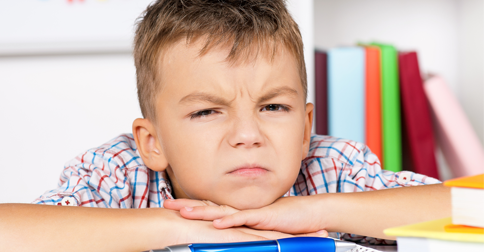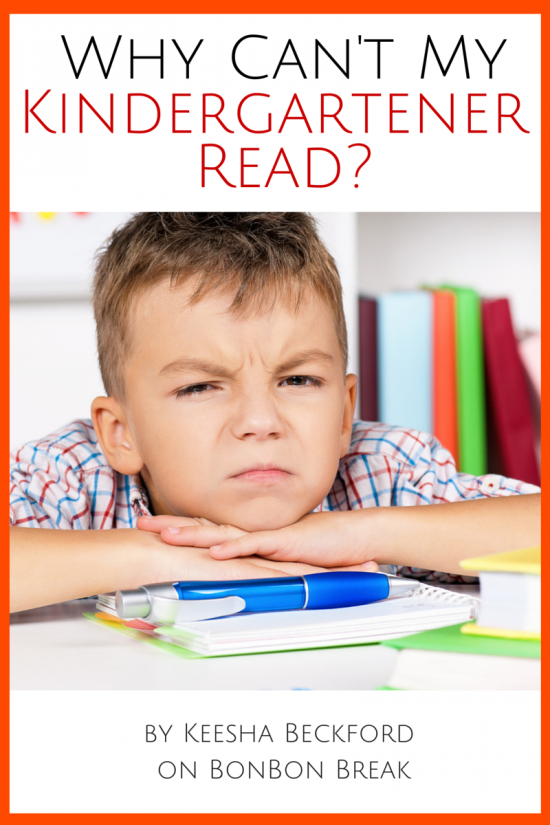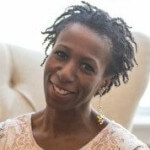Why Can’t My Kindergartener Read?

Hubby and I were firm believers in the research stating that children learned best through play — that through play they learned how to interact with others and with the environment. They learned fine and gross motor skills, reading, writing, math, science and more.
We chose preschools where this play-based, experiential, child-centered learning was a main focus.
I had a few friends whose children went to schools with a drill-and-grill approach, where the kids were asked to recite the preamble to the U.S. Constitution or study the presidents. Yes, that includes you, Millard Fillmore.
That was fine for them, but I wanted no part of that. None. I wanted learning that was relevant to my kids’ world and didn’t treat them like a fancy handbag or show pony with which to impress adults at parties. And plus, I didn’t want them — or us — to be stressed out.
And furthermore, it wasn’t like my kids would be left behind. I read when I was three and had some fancy schools under my belt. Their grandmother, whom they saw almost daily, was a retired elementary school teacher. Hubby was no intellectual slouch either.
But then a few friends’ children began to read. Some women I knew were less than pleased that their kids hadn’t graduated from preschool with a firm grasp of their upper and lower case letters. All the literature seemed to emphasize how Common Core made age 5 the new 6, and that kids, especially those who had attended kumbaya preschools, would have a rude awakening in public kindergarten.
I jumped on the HMS Freakout, where I saw my son’s life raft surrounded by sharks.
We tried to avert disaster with fun stories and workbooks. We practically held his eyelids open and stood him in front of shows like Super WHY! and Sesame Street. We asked him to be still 596 times per reading “workout.” There were people going through heroin withdrawal who fidgeted less than that boy when asked to look at a book or worksheet.
He made some progress, but no great strides. He was frustrated and began to doubt his intelligence. Once kindergarten began, homework became a struggle that made me wonder why schools didn’t fundraise with wine companies, if not vodka by the barrel.
I remembered when I was teaching at an uber-fancy private school in NYC, the story of a parent who allegedly sat, almost sobbing, in the Lower School Head’s office. “I went to Princeton and my husband to Stanford,” this woman lamented about her daughter. “What do you mean she can’t re-e-e-ad?!!!”
I giggled archly then, but I wasn’t laughing now.
We began to wonder if we should have our son tested. What was wrong with him?
I began to turn on my husband.
“Were you like this?” I asked him.
“Like what?” he answered.
“Oh come on, you know what I mean.”
“Don’t you even go there.”
Here we were working so hard to get him to sound out fun little words, and it was like we were asking him to well, read the friggin’ preamble to the Constitution. I was doubting my life partner and we were doubting our son, not to mention his entire preschool experience.
“We’re not very patient people,” Hubby said. “And we need to be.”
We persevered. Thankfully my son’s school believed in a gentle approach, and per weekday night, we only lost a half hour of our lives for homework as opposed to the longer-than-Gladiator-and-Gandhi-put-together homework sessions some schools gave.
Because he was far more patient, Hubby worked with Mr. R most of the time. We cut down on screen time. We tried to remember that he was only a little boy. Not even six.
Then, finally, it happened. He began sounding out words. Recognizing sight words. Not being so fidgety. Reading.
He was reading! We were beside ourselves.
Suddenly all the negativity disappeared. Floated away like the steam off a hot cup of tea. I felt ridiculous for all the anxiety, stress, anger and blame. I felt guilty for buying into it, but I felt even more horrid for all the pressure I had put on my son, simply because I was insecure, craving a stamp of approval on my parenting and some sign of my son’s future success. Simply because I thought his reading was a measure of how much I valued education. Of how much I had devoted to his very life.
Once again I had fallen into a trap of self-judgment, where I saw my children’s milestones and achievements as the yardstick of my mothering.
It had once been the end dates on bottles and pacis, or when my kids walked and talked. Would it ever stop?
Making sure your child is on par with his peers is normal. But sometimes it’s too much to know whose kid can count to two hundred at age four. It became noise, a tin drum banging in my head, drowning out all else, to the point where I couldn’t even see what my beautiful boy could do.
Or what he needed.
I couldn’t even take in the hurt in his eyes when I asked for more. For something else, something better. When I demanded something my son wasn’t ready to do, even though some scientist, or politician, said he should have been.
How can we ask our kids to be patient, to be present, when we don’t give them the same courtesy?
It’s one of the hardest lessons out there, one that’s right at our fingertips, then zooms away, the second we reach out to catch it.
READ MORE AT THE FRONT PORCH
PIN IT FOR LATER:

This post was written by Keesha Beckford exclusively for BonBon Break Media, LLC.

